对外经济贸易大学:《高级商务英语听说》课程教学资源(课件讲稿)Unit 13 Effective Communication—Language and Culture 有效沟通—语言文化
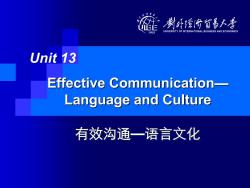
制舒爱价買易大考 1951 UNIVERSITY OF INTERNATIONAL BUSINESS AND ECONOMICS Unit 13 Effective Communication- Language and Culture 有效沟通一语言文化
Effective Communication— Language and Culture 有效沟通 —语言文化 Effective Communication Effective Communication — Language and Culture Language and Culture 有效沟通 —语言文化 Unit 13
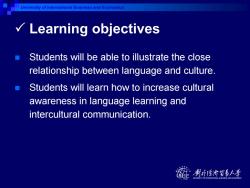
University of International Business and Economics Learning objectives Students will be able to illustrate the close relationship between language and culture. Students will learn how to increase cultural awareness in language learning and intercultural communication. 制纤经价蜀易大学 UNIVERSITY OF INTERNATIONAL BUSINESS AND ECONOMCS
University of International Business and Economics 3 Learning objectives Students will be able to illustrate the close relationship between language and culture. Students will learn how to increase cultural awareness in language learning and intercultural communication
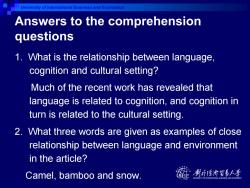
University of International Business and Economics Answers to the comprehension questions 1.What is the relationship between language, cognition and cultural setting? Much of the recent work has revealed that language is related to cognition,and cognition in turn is related to the cultural setting. 2.What three words are given as examples of close relationship between language and environment in the article? Camel,bamboo and s snow. 尉卧价黄易大岁 15 UNIVERSITY OF INTERNATIONAL BUSINESS AND ECONOMCS
University of International Business and Economics Answers to the comprehension questions 1. What is the relationship between language, cognition and cultural setting? Much of the recent work has revealed that language is related to cognition, and cognition in turn is related to the cultural setting. 2. What three words are given as examples of close relationship between language and environment in the article? Camel, bamboo and snow
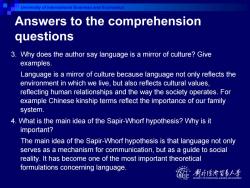
University of International Business and Economics Answers to the comprehension questions 3.Why does the author say language is a mirror of culture?Give examples. Language is a mirror of culture because language not only reflects the environment in which we live,but also reflects cultural values, reflecting human relationships and the way the society operates.For example Chinese kinship terms reflect the importance of our family system. 4.What is the main idea of the Sapir-Whorf hypothesis?Why is it important? The main idea of the Sapir-Whorf hypothesis is that language not only serves as a mechanism for communication,but as a guide to social reality.It has become one of the most important theoretical formulations concerning language. 制卧爱价贸易大孝
University of International Business and Economics Answers to the comprehension questions 3. Why does the author say language is a mirror of culture? Give examples. Language is a mirror of culture because language not only reflects the environment in which we live, but also reflects cultural values, reflecting human relationships and the way the society operates. For example Chinese kinship terms reflect the importance of our family system. 4. What is the main idea of the Sapir-Whorf hypothesis? Why is it important? The main idea of the Sapir-Whorf hypothesis is that language not only serves as a mechanism for communication, but as a guide to social reality. It has become one of the most important theoretical formulations concerning language
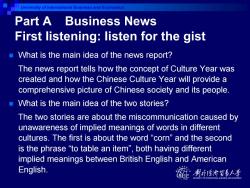
University of International Business and Economics Part A Business News First listening:listen for the gist What is the main idea of the news report? The news report tells how the concept of Culture Year was created and how the Chinese Culture Year will provide a comprehensive picture of Chinese society and its people. What is the main idea of the two stories? The two stories are about the miscommunication caused by unawareness of implied meanings of words in different cultures.The first is about the word "corn"and the second is the phrase "to table an item",both having different implied meanings between British English and American English. 制卧面价質易大孝
University of International Business and Economics Part A Business News First listening: listen for the gist What is the main idea of the news report? The news report tells how the concept of Culture Year was created and how the Chinese Culture Year will provide a comprehensive picture of Chinese society and its people. What is the main idea of the two stories? The two stories are about the miscommunication caused by unawareness of implied meanings of words in different cultures. The first is about the word “corn” and the second is the phrase “to table an item”, both having different implied meanings between British English and American English
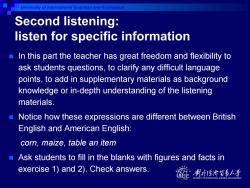
University of International Business and Economics Second listening: listen for specific information In this part the teacher has great freedom and flexibility to ask students questions,to clarify any difficult language points,to add in supplementary materials as background knowledge or in-depth understanding of the listening materials. Notice how these expressions are different between British English and American English: corn,maize,table an item Ask students to fill in the blanks with figures and facts in exercise 1)and 2).Check answers. 制计爱价贸易大考 15
University of International Business and Economics Second listening: listen for specific information In this part the teacher has great freedom and flexibility to ask students questions, to clarify any difficult language points, to add in supplementary materials as background knowledge or in-depth understanding of the listening materials. Notice how these expressions are different between British English and American English: corn, maize, table an item Ask students to fill in the blanks with figures and facts in exercise 1) and 2). Check answers
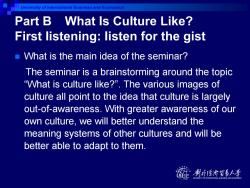
University of International Business and Economics Part B What Is Culture Like? First listening:listen for the gist What is the main idea of the seminar? The seminar is a brainstorming around the topic "What is culture like?".The various images of culture all point to the idea that culture is largely out-of-awareness.With greater awareness of our own culture,we will better understand the meaning systems of other cultures and will be better able to adapt to them. 制仟香价贸易大孝 UNIVERSITY OF INTERNATIONAL BUSINESS AND ECONOMCS
University of International Business and Economics Part B What Is Culture Like? First listening: listen for the gist What is the main idea of the seminar? The seminar is a brainstorming around the topic “What is culture like?”. The various images of culture all point to the idea that culture is largely out-of-awareness. With greater awareness of our own culture, we will better understand the meaning systems of other cultures and will be better able to adapt to them
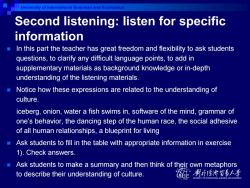
University of International Business and Economics Second listening:listen for specific information In this part the teacher has great freedom and flexibility to ask students questions,to clarify any difficult language points,to add in supplementary materials as background knowledge or in-depth understanding of the listening materials. Notice how these expressions are related to the understanding of culture. iceberg,onion,water a fish swims in,software of the mind,grammar of one's behavior,the dancing step of the human race,the social adhesive of all human relationships,a blueprint for living Ask students to fill in the table with appropriate information in exercise 1).Check answers. Ask students to make a summary and then think of their own metaphors to describe their understanding of culture. 封卧价贺多大生
University of International Business and Economics Second listening: listen for specific information In this part the teacher has great freedom and flexibility to ask students questions, to clarify any difficult language points, to add in supplementary materials as background knowledge or in-depth understanding of the listening materials. Notice how these expressions are related to the understanding of culture. iceberg, onion, water a fish swims in, software of the mind, grammar of one’s behavior, the dancing step of the human race, the social adhesive of all human relationships, a blueprint for living Ask students to fill in the table with appropriate information in exercise 1). Check answers. Ask students to make a summary and then think of their own metaphors to describe their understanding of culture
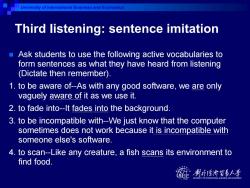
University of International Business and Economics Third listening:sentence imitation Ask students to use the following active vocabularies to form sentences as what they have heard from listening (Dictate then remember). 1.to be aware of--As with any good software,we are only vaguely aware of it as we use it. 2.to fade into--It fades into the background. 3.to be incompatible with--We just know that the computer sometimes does not work because it is incompatible with someone else's software. 4.to scan--Like any creature,a fish scans its environment to find food. 制卧价贸易大孝 UNIVERSITY OF INTERNATIONAL BUSINESS AND ECONOMCS
University of International Business and Economics Third listening: sentence imitation Ask students to use the following active vocabularies to form sentences as what they have heard from listening (Dictate then remember). 1. to be aware of--As with any good software, we are only vaguely aware of it as we use it. 2. to fade into--It fades into the background. 3. to be incompatible with--We just know that the computer sometimes does not work because it is incompatible with someone else's software. 4. to scan--Like any creature, a fish scans its environment to find food
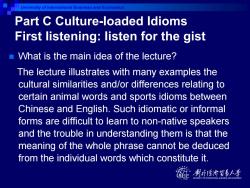
University of International Business and Economics Part C Culture-loaded Idioms First listening:listen for the gist What is the main idea of the lecture? The lecture illustrates with many examples the cultural similarities and/or differences relating to certain animal words and sports idioms between Chinese and English.Such idiomatic or informal forms are difficult to learn to non-native speakers and the trouble in understanding them is that the meaning of the whole phrase cannot be deduced from the individual words which constitute it. 制计爱价贫易大学 15 UNIVERSITY OF INTERNATIONAL BUSINESS AND ECONOMCS
University of International Business and Economics Part C Culture-loaded Idioms First listening: listen for the gist What is the main idea of the lecture? The lecture illustrates with many examples the cultural similarities and/or differences relating to certain animal words and sports idioms between Chinese and English. Such idiomatic or informal forms are difficult to learn to non-native speakers and the trouble in understanding them is that the meaning of the whole phrase cannot be deduced from the individual words which constitute it
按次数下载不扣除下载券;
注册用户24小时内重复下载只扣除一次;
顺序:VIP每日次数-->可用次数-->下载券;
- 对外经济贸易大学:《高级商务英语听说》课程教学资源(课件讲稿)Unit 12 On the Business Legal Front 站在商业法律前沿.pdf
- 对外经济贸易大学:《高级商务英语听说》课程教学资源(课件讲稿)Unit 11 Making Investment Rationally 理性投资.pdf
- 对外经济贸易大学:《高级商务英语听说》课程教学资源(课件讲稿)Unit 9 Recruitment & Performance Appraisal 招聘和业绩评估.pdf
- 对外经济贸易大学:《高级商务英语听说》课程教学资源(课件讲稿)Unit 10 Financial World 金融世界.pdf
- 对外经济贸易大学:《高级商务英语听说》课程教学资源(课件讲稿)Unit 8 Motivating Employees 员工激励.pdf
- 对外经济贸易大学:《高级商务英语听说》课程教学资源(课件讲稿)Unit 7 Management Gurus 管理大师.pdf
- 对外经济贸易大学:《高级商务英语听说》课程教学资源(课件讲稿)Unit 6 Advertising Appeals—Image & Personality 广告诉求—形象和性格.pdf
- 对外经济贸易大学:《高级商务英语听说》课程教学资源(课件讲稿)Unit 4 Consumer Behavior 消费者行为.pdf
- 对外经济贸易大学:《高级商务英语听说》课程教学资源(课件讲稿)Unit 3 Making Economic Sense 解读经济.pdf
- 对外经济贸易大学:《高级商务英语听说》课程教学资源(课件讲稿)Unit 2 Hot Issues in International Trade 国际贸易的热点问题.pdf
- 对外经济贸易大学:《高级商务英语听说》课程教学资源(课件讲稿)Unit 1 Globalization Trend 全球化趋势.pdf
- 对外经济贸易大学:《高级商务英语听说》课程教学资源(授课教案)Unit 18 New Economy and E-commerce 新经济与电子商务.pdf
- 对外经济贸易大学:《高级商务英语听说》课程教学资源(授课教案)Unit 17 Get Yourself Wired—Internet and Mobile Phones 连线时代—互联网与移动电话.pdf
- 对外经济贸易大学:《高级商务英语听说》课程教学资源(授课教案)Unit 16 A Socially Responsible Corporation—Business Ethics 企业社会责任—商业伦理.pdf
- 对外经济贸易大学:《高级商务英语听说》课程教学资源(授课教案)Unit 15 Organizational Culture—Competitive Advantage 企业文化—竞争优势.pdf
- 对外经济贸易大学:《高级商务英语听说》课程教学资源(授课教案)Unit 14 Cultural Differences—Manners and Taboos 文化差异—禁忌礼仪.pdf
- 对外经济贸易大学:《高级商务英语听说》课程教学资源(授课教案)Unit 13 Effective Communication—Language and Culture 有效沟通—语言文化.pdf
- 对外经济贸易大学:《高级商务英语听说》课程教学资源(授课教案)Unit 12 On the Business Legal Front 站在商业法律前沿.pdf
- 对外经济贸易大学:《高级商务英语听说》课程教学资源(授课教案)Unit 11 Making Investment Rationally 理性投资.pdf
- 对外经济贸易大学:《高级商务英语听说》课程教学资源(授课教案)Unit 10 Financial World 金融世界.pdf
- 对外经济贸易大学:《高级商务英语听说》课程教学资源(课件讲稿)Unit 14 Cultural Differences—Manners and Taboos 文化差异—禁忌礼仪.pdf
- 对外经济贸易大学:《高级商务英语听说》课程教学资源(课件讲稿)Unit 15 Organizational Culture—Competitive Advantage 企业文化—竞争优势.pdf
- 对外经济贸易大学:《高级商务英语听说》课程教学资源(课件讲稿)Unit 16 A Socially Responsible Corporation—Business Ethics 企业社会责任—商业伦理.pdf
- 对外经济贸易大学:《高级商务英语听说》课程教学资源(课件讲稿)Unit 17 Get Yourself Wired—Internet and Mobile Phones 连线时代—互联网与移动电话.pdf
- 对外经济贸易大学:《高级商务英语听说》课程教学资源(课件讲稿)Unit 18 New Economy and E-commerce 新经济与电子商务.pdf
- 对外经济贸易大学:《商务英语》课程教学资源(教学大纲).pdf
- 对外经济贸易大学:《商务英语》课程教学资源(试卷习题)期末考试试卷(一).pdf
- 对外经济贸易大学:《商务英语》课程教学资源(试卷习题)期末考试试卷(一)答案.pdf
- 对外经济贸易大学:《商务英语》课程教学资源(试卷习题)期末考试试卷(二).pdf
- 对外经济贸易大学:《商务英语》课程教学资源(试卷习题)期末考试试卷(二)答案.pdf
- 对外经济贸易大学:《商务英语》课程教学资源(课后练习,共三十六章).pdf
- 对外经济贸易大学:《商务英语》课程教学资源(学习指南).pdf
- 对外经济贸易大学:《商务英语》课程教学资源(授课教案)Chapter 1 What Is Economics.pdf
- 对外经济贸易大学:《商务英语》课程教学资源(授课教案)Chapter 2 Needs and Wants.pdf
- 对外经济贸易大学:《商务英语》课程教学资源(授课教案)Chapter 3 Supply and Demand.pdf
- 对外经济贸易大学:《商务英语》课程教学资源(授课教案)Chapter 4 Consumer Market In China.pdf
- 对外经济贸易大学:《商务英语》课程教学资源(授课教案)Chapter 6 Brief History of Business.pdf
- 对外经济贸易大学:《商务英语》课程教学资源(授课教案)Chapter 7 Business Environment.pdf
- 对外经济贸易大学:《商务英语》课程教学资源(授课教案)Chapter 8 What is Production.pdf
- 对外经济贸易大学:《商务英语》课程教学资源(授课教案)Chapter 9 Factors of Production.pdf
